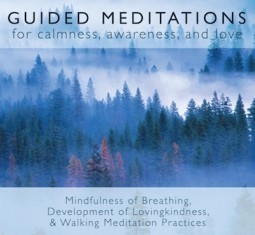Words of kindness, words of compassion
 There are many ways to develop metta (kindness, or lovingkindness), which is the desire that beings, ourselves included, be happy. Kindness arises from a basic realization that all beings want to be happy, and that their happiness and suffering are as real to them as our own happiness and suffering are to us. Recognizing those facts, and knowing that we ourselves want to be happy, we naturally wish happiness for others.
There are many ways to develop metta (kindness, or lovingkindness), which is the desire that beings, ourselves included, be happy. Kindness arises from a basic realization that all beings want to be happy, and that their happiness and suffering are as real to them as our own happiness and suffering are to us. Recognizing those facts, and knowing that we ourselves want to be happy, we naturally wish happiness for others.
Kindness is inherent in us all, and in the meditation practice we’re strengthening what’s already there, not bringing something entirely new into being.
The most well-known way to cultivate metta is drop phrases into the mind that strengthen and develop our kindness. When I was taught the metta bhavana (development of lovingkindness) meditation practice, the phrases I was given were: “May all beings be well; may all beings be happy; may all beings be free from suffering.” (In the first four stages “all beings” is replaced with “I” or “you.”)
These are excellent phrases, although not everyone finds that they resonate and there’s no need to stick to those exact words. I’ve often encouraged people to experiment and to find phrases that are effective in evoking a sense of kindness and love. I’ve still tended, on the whole, to stick with those particular words, though. They’re deeply embedded in my mind, since I was taught them over 30 years ago and have repeated them probably hundreds of thousands of times.
But in recent years I’ve seen that there’s a good reason to change the phrases I use, and nowadays I tend to use, and teach, the metta phrases like this: “May all beings be well; may all beings be happy; may all beings find peace.”
The reason I stopped using “May all beings be free from suffering” and started using “May all beings find peace” is because I’ve been doing more exploration of a practice related to the metta bhavana: the karuna bhavana. Karuna is compassion, and the karuna bhavana is the meditation practice in which we cultivate compassion.
Metta (kindness) is the desire that beings be happy; karuna (compassion) is the desire that beings be free from suffering. The relationship between the two is simply that when we want beings to be happy and are aware that they suffer, we want their suffering to be removed. Kindness naturally turns into compassion whenever we become aware of suffering.
Now the problem with using the phrase “May all beings be free from suffering” in the metta bhavana practice is that it’s inherently a phrase that evokes compassion rather than kindness. Metta, strictly speaking, is about wishing happiness rather than removing suffering. When we use the phrase “May all beings be free from suffering” in the metta practice we’re actually cultivating both metta and compassion at the same time. This isn’t a huge problem, but it does muddy the distinction between metta and karuna. So purely from the standpoint of wanting to be clear in my teaching I prefer to avoid talking about wanting beings to be free from suffering as part of the metta practice.
 If you like my articles and want to support the work I do, please click here to check out my books, guided meditation CDs, and MP3s. Or you can make a donation.Making this change to the phrases, when you start practicing the karuna bhavana practice you feel more of a shift in what you’re doing. It’s clearer that metta is kindness — wanting beings to be happy — and that compassion is another — wanting beings to be free from suffering so that they can be happy. In the karuna bhavana I use phrases like: “May all beings be free from suffering; May all beings have joy and ease.”
If you like my articles and want to support the work I do, please click here to check out my books, guided meditation CDs, and MP3s. Or you can make a donation.Making this change to the phrases, when you start practicing the karuna bhavana practice you feel more of a shift in what you’re doing. It’s clearer that metta is kindness — wanting beings to be happy — and that compassion is another — wanting beings to be free from suffering so that they can be happy. In the karuna bhavana I use phrases like: “May all beings be free from suffering; May all beings have joy and ease.”
It’s a small shift, to reserve “May all beings be free from suffering” for the compassion meditation, but it’s one that I’ve find brings more of a sense of clarity to the practice.
Now as I’ve said, this isn’t a huge deal. Compassion is inherent in kindness. If we’re developing the desire that beings be well and happy then it’s natural to wish them freedom from suffering. And sometimes when you’re cultivating metta you’re going to be aware of someone’s suffering and compassion will naturally arise, since compassion is simply kindness meeting an awareness of suffering. I’m certainly not suggesting that you shouldn’t experience compassion during the metta bhavana practice! But there is a difference between metta and karuna, and I think it’s useful — without being too strict about it — to respect that difference.”
“May all beings be well; may all beings be happy; may all beings find peace.”
Related posts:
Cultivating compassion (Day 26)
An awareness imbued with compassion (Day 49)
Bringing kindness to mind (Day 1)
Related posts brought to you by Yet Another Related Posts Plugin.




